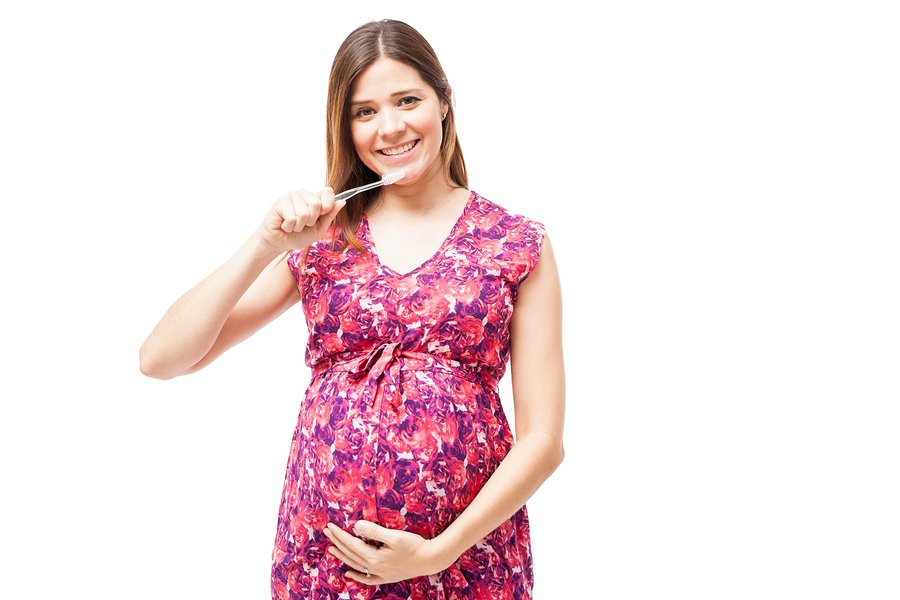Although it is a joyous occasion, pregnancy comes with numerous challenges that can make day-to-day life more difficult. One of these challenges involves hormonal changes that can lead to an increased risk of cavities and gum disease. To make sure your mouth stays healthy before, during and after your delivery, consider this guide on oral health and pregnancy.
How Does Pregnancy Affect Oral Health?
During the first trimester of pregnancy, a woman experiences significant hormonal changes that affect multiple parts of her body. In addition to altering immune function, these hormones are known to change the way the body deals with oral bacteria and inflammation. For this reason, it’s important to pay special attention to your oral health, from the moment you begin planning your pregnancy to the moment you give birth.
Before Your Pregnancy
Consider making a preemptive dental appointment with your local dentist before you start trying to conceive. This will give you an opportunity to have your teeth professionally cleaned. It will also allow the dentist to carefully examine your gums to see if there are any oral health problems that should be treated before your pregnancy.
While You Are Pregnant
While routine dental care can be performed any time during pregnancy, you should definitely tell your dentist that you are expecting. You should also tell your dentist the names and dosages of any medications you are taking, including fish oils, prenatal vitamins or other supplements.
Urgent dental procedures can still be scheduled during your pregnancy; however, you should postpone elective dental procedures until after delivery. You should also check with your obstetrician before scheduling a dental appointment to see if he or she has any special instructions or precautions for your particular situation. Make sure to relay this information to your dentist, so he or she can make any necessary alterations or exceptions when performing oral treatments.
Whatever you do, don’t skip your dental checkup appointment because of your pregnancy. While you are pregnant, you should also be sure to maintain a strict brushing and flossing routine to prevent or reduce oral health problems.
Can You Get a Dental X-ray While Pregnant?
Thanks to advances in modern technology, x-ray devices are much safer than they used to be. Dental x-rays are generally considered to be safe during pregnancy; however, your dentist will usually take steps to safeguard you and your baby. This may include using extra protection to shield your abdomen and thyroid from radiation.
Is it Normal to Have Sensitive Teeth during Pregnancy?
As pregnancy alters hormones, the body responds to oral bacteria differently. Many times, this can cause sore teeth and gums, due to increased blood flow or gingivitis. You can reduce oral discomfort during pregnancy by adhering to the following guidelines:
- Choose a toothbrush with soft bristles that won’t irritate your sore teeth or gums.
- Avoid foods that trigger discomfort, including hard foods, hot foods and very cold foods.
- See your dentist to make sure your soreness is not stemming from periodontal disease.
Will I Get Canker Sores during Pregnancy?
Also known as aphthous ulcers, canker sores are small lesions that appear on the soft tissues inside your mouth. While their exact cause is unclear, there are specific triggers that can cause them to develop. One of these triggers includes hormonal changes due to pregnancy.
Although they can be painful, canker sores are not contagious and usually go away on their own. If your canker sores become especially sore or persist for longer than a few weeks, however, you should see a dentist or general physician to rule out an underlying cause or the presence of cancerous cells.
What Are Some Myths About Pregnancy and Oral Health?
When it comes to understanding the relationship between pregnancy and oral health, it helps to know fact from fiction. Some common myths can keep pregnant women from taking smart precautions when they are expecting. These include:
Myth: My oral health won’t affect my baby.
Reality: Women with severe or moderate gum disease are at a higher risk for low-birth weights and early deliveries.
Myth: Pregnancy will leach calcium from the teeth.
Reality: This myth probably stems from the fact that women are more prone to tooth decay when pregnant. While it is important to get plenty of calcium while pregnant, your baby will not take calcium from your teeth.
Myth: Morning sickness is mostly harmless.
Reality: Repeated vomiting can dissolve tooth enamel and reduce your teeth’s defenses against decay. If you experience severe morning sickness, ask your dentist about rinsing with baking soda, wearing a mouth guard and other techniques that can reduce harm.
Myth: You should brush immediately after vomiting.
Reality: While no one enjoys the taste of vomit, you can actually damage your teeth if you reach for your toothbrush too soon. This is due to the presence of gastric acids, which can erode tooth enamel. If you brush too soon after vomiting, you can reduce your teeth’s natural defenses, leaving them more susceptible to cavities, sensitivity and fractures. Instead, rinse with plain water or baking soda to neutralize and eliminate the acid in your mouth. Afterword, you can go ahead and brush your teeth without having to worry about causing unintentional damage.
Taking Your Oral Health Seriously
Even if you have flawless oral hygiene, you are still at a higher risk of dental issues if you get pregnant. While you can reduce your risk through routine brushing and flossing, it’s also important to visit a dental professional for regular cleanings and examinations. It may seem like a small issue now, but dental complications can have a serious short- and long-term impact on you, your pregnancy and your baby’s health.


 Previous Article
Previous Article

